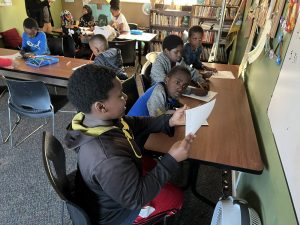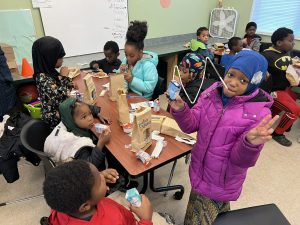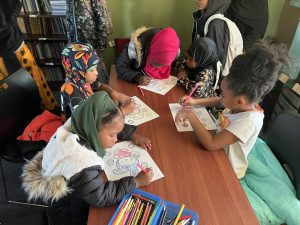Ethiopian Tewahedo Social Services (ETSS) is a community-based nonprofit organization that helps new arrivals from over 80 countries establish roots and gain self-sufficiency in central Ohio. Established in 2000, the agency was created for refugee and immigrant families by refugee and immigrant families.

Over almost 30 years, ETSS has engaged individuals and families in programs ranging from job preparedness and placement, family care, community health and wellness and more. For nearly 14 years, it’s implemented an After-School Program and Summer Youth Enrichment Program, which ADAMH is proud to help fund.
The program supports immigrant and refugee children who experience challenges such as traumatic pasts and cultural marginalization.
Last year, ADAMH – along with other funding sources – supported 1,066 children in ETSS’s After-School and Summer Camp programs by providing funds for social emotional learning (SEL), academic supports and more.
“We’re slowly growing our work when it comes to prevention, too, so we are extremely grateful for our partnership with ADAMH,” said Sarah Huffman, Lead Youth Program Manager for ETSS.
Developing critical social emotional awareness
To Sarah, the After-School Program is reaching children at an intimate level.
“We have a 1 to 10 ratio in our programs, which is great because we’re able to provide that mentorship and really be a positive role model for the students we serve,” she said.
The program serves Franklin and Licking County youth in grades K-12, providing support focused on math and literacy, SEL, health and wellness, cultural enrichment and STEAM (Science, Technology, Engineering, Art and Math).
ADAMH funds are used to support the program’s staffing, school supplies, field trips and additional food or snacks at ETSS’s Bending Brook, Trabue Crossing and Emerald Glen sites. The funds also support professional development for ETSS staff.
While the program provides a holistic approach in services, SEL is a key focus area, said Diego Cornejo, Youth Program Manager at the Bending Brook site.
“Behavioral issues are very common in our kids because of the trauma they’ve experienced, which is why we have a very intentional approaches to SEL,” he said.

As an SEL Coordinator, Ellen McDaniel has helped the program’s SEL department provide more than just instruction by also addressing the needs of the students.
“A lot of what we’re working toward is helping our students be competent, while also empowering them to express themselves,” she said. “Our kids go through a lot. Whether they’ve just come to our country or they were born here, they’re living in two different worlds.”
Through the Collaborative for Academic Social Emotional Learning (CASEL), the children learn how to be competent in the areas of self-awareness, self-management, responsible decision making, relationship skills and social awareness.
“I’m helping students identify their emotions to be able to identify their strengths and weaknesses,” Ellen said. “Sometimes I’ll even make site-specific or student specific SEL plans.”
Ellen said this approach to SEL, along with the support of bilingual assistants, has helped the immigrant and refugee students navigate their behavioral issues immensely.
“A lot of these kids I know pretty well, and I’ve watched them grow and hit milestones, develop more confidence, self-awareness, and knowing that allows me to do the work I do,” she said.
Giving children holistic opportunities for growth
To Diego, ETSS’s After-School Program gives students the tools to help them succeed in their traditional school environment.
“There’s a lot of research about immigrant communities being 2 to 3 years behind the learning process because of lack of communication and engagement from the parents, so these after school programs help bridge the gap so students can really catch up,” he said.
Because of barriers immigrant and refugee youth face, Sarah considers the program sites to be safe and supervised spaces where children get to explore.
“We develop meaningful relationships with the students, opportunity and hope that the students otherwise wouldn’t be able to experience,” she said. “We’re able to teach our kids about STEAM and social emotional learning and how those components can reduce absenteeism, truancy and support academic growth."
And as vital as a child’s academic development is, Ellen can’t stress enough how important the ETSS After-School Program is to giving students a chance to be care-free, too.
“ETSS is the place a lot of these kids let their hair down,” she said. “When they go to school it’s so rigid and foreign from their home, and then when they’re home, there’s this expectation to carry on the culture. But when they’re at this program, the kids just get to be kids.”

